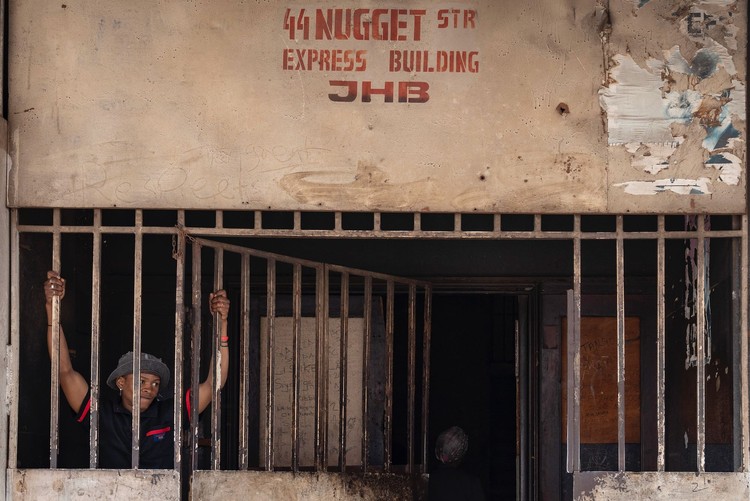
30 September 2024
The entrance to the unlawfully occupied Nugget Street Express Building in Johannesburg’s city centre which GroundUp wrote about a year ago. Photo: Ihsaan Haffejee
The City of Johannesburg has a longstanding housing crisis and thousands of people find themselves unlawfully occupying buildings and vacant land.
Local government has an obligation to find suitable alternative housing when these people are evicted and left homeless.
Recently, the City adopted a Temporary Emergency Accommodation (TEA) policy as its tool for providing alternative housing for unlawful occupiers.
While this may seem like a workable answer at first glance, reliance on such a policy does not provide any long-term solutions and undermines the objective of giving poor people access to decent, stable homes. It also goes against the City’s obligations in terms of the Constitution and other relevant laws.
The fact that TEA is temporary by definition is one of its most obvious problems. TEA was developed to serve as emergency housing in the event of unforeseen disasters or unusual events, such as floods, fires or other natural disasters. It is not the solution to the much needed permanent fix for the ongoing housing crisis in Johannesburg.
The City is only temporarily solving the issue. Placing people in temporary housing from permanent (albeit unlawful) housing, puts people and families already living in precarious conditions in a vicious circle of instability. People lose the sense of permanency that comes with having a home. TEA lacks the community and infrastructure that permanent housing offers. This contributes to furthering indignity and inequality.
For older and younger occupants, in particular, moving from permanent housing to temporary housing can have detrimental social, psychological and emotional effects.
Currently, to be eligible for TEA, a household’s total monthly income cannot be more than R3,500. This amount ignores the complex and varied financial realities that many households face. Larger families or multigenerational households are disproportionately impacted by this blanket limit, as they may be denied aid even though they continue to require financial support.
It also ignores the high cost of living in Johannesburg, where R3,500 is insufficient for stable housing, let alone taking care of other necessities like food, security and transportation. By setting such a rigid threshold, the City risks excluding some of the most vulnerable families from accessing housing.
The City’s reliance on TEA in cases of unlawful occupiers is a fundamental misalignment of purpose. By repurposing TEA to deal with unlawful occupiers, the City is failing to address the underlying causes of the housing issue.
TEA is meant to be used in emergency situations – those in which people have to flee their homes because of unanticipated disasters or extraordinary circumstances. By contrast, situations involving unlawful occupiers, are neither unexpected nor out of the ordinary.
In eviction cases, a standard court order often asks for meaningful consultations between parties, which should afford the City ample time to provide suitable accommodation for the unlawful occupiers. Moreover, the unlawful occupation of buildings and land in Johannesburg is a well-known, longstanding issue, often driven by deep-seated socio-economic factors such as poverty, inequality and lack of access to affordable housing.
Using TEA in these situations results in more people being displaced without providing them with long-term answers. It raises the question: is the City sincerely interested in resolving the ongoing housing problems, or is it instead searching for band-aid solutions to appease legal and social pressures?
The City is required by the TEA standards to offer emergency housing for a maximum of six months. After that time, what happens to the residents? Will they be rendered homeless?
The City of Johannesburg needs to stop seeing temporary emergency accommodation as a solution and start concentrating on long-term, stable, sustainable housing alternatives in order to successfully address the issue of unlawful occupiers.
Measures should include upgrading informal settlements and expanding social housing, which provides low-income households with a long-term solution, using public funding and forming partnerships with private developers.
The City should step up transitional housing programmes, which provide a safe, inexpensive place to live for a set amount of time (one to three years) to people or families who have been displaced. Such initiatives can act as a link between short-term and long-term housing.
The City also needs to play its part in addressing structural issues such as land ownership,
Views expressed are not necessarily those of GroundUp.